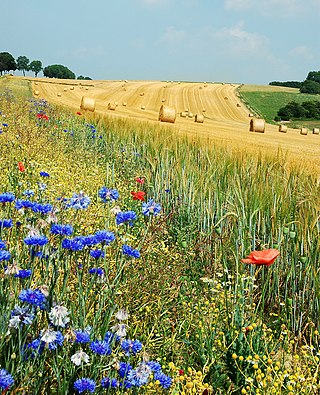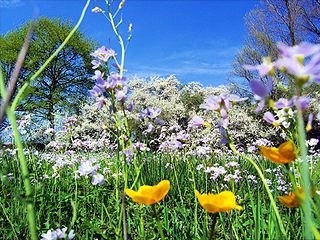
Summer or summertime is the hottest and brightest of the four temperate seasons, occurring after spring and before autumn. At or centred on the summer solstice, daylight hours are the longest and darkness hours are the shortest, with day length decreasing as the season progresses after the solstice. The earliest sunrises and latest sunsets also occur near the date of the solstice. The date of the beginning of summer varies according to climate, tradition, and culture. When it is summer in the Northern Hemisphere, it is winter in the Southern Hemisphere, and vice versa.
These are the public holidays observed in Ireland. Public holidays in Ireland may commemorate a special day or other event, such as Saint Patrick's Day or Christmas Day. On public holidays, most businesses and schools close. Other services, for example, public transport, still operate but often with reduced schedules.

Spring, also known as springtime, is one of the four temperate seasons, succeeding winter and preceding summer. There are various technical definitions of spring, but local usage of the term varies according to local climate, cultures and customs. When it is spring in the Northern Hemisphere, it is autumn in the Southern Hemisphere and vice versa. At the spring equinox, days and nights are approximately twelve hours long, with daytime length increasing and nighttime length decreasing as the season progresses until the Summer Solstice in June and December.

Public holidays in New Zealand consist of a variety of cultural, national, and religious holidays that are legislated in New Zealand. Workers can get a maximum of 12 public holidays and a minimum of 20 annual leave days a year.

Spring break is a vacation period at universities and schools that includes the Easter holiday, and takes place in early Northern Hemisphere spring. Introduced in the U.S. during the 1930s, spring break has been observed in Europe since the late 19th century, and is observed in many other countries. Spring break is associated with riotous partying at warm-weather locations.
An academic term is a portion of an academic year during which an educational institution holds classes. The schedules adopted vary widely. Specific synonyms are commonly used to denote the duration or a term. In most countries, the academic year begins in late summer or early autumn and ends during the following spring or summer.

A summer camp is a supervised overnight program for children conducted during the summer vacation from school in many countries. Children and adolescents who attend summer residential camps are known as campers. They generally are offered overnight accommodations for one or two weeks out in an outdoor natural campsite setting. Day camps, by contrast, offer the same types of experience in the outdoors but children return home each evening. Summer school is a different experience that is usually offered by local schools for their students focused on remedial education to ensure students are prepared for the upcoming academic year or in the case of high school students, to retake failed state comprehensive exams necessary for graduation. Summer residential and day camps may include an academic component but is not a requirement.

An academic year, or school year, is a period that schools, colleges and universities use to measure the duration of studies for a given educational level. Academic years are often divided into academic terms. Students attend classes and do relevant exams and homework during this time, which comprises school days and school holidays. The duration of school days, holidays and school year varies across the world. The days in the school year depend on the state or country as In Maryland there are 180 days in a school year, but in Minnesota there are 165 days in the year.
The term summer vacation or summer break refers to a school break in the summer between school years and the break in the school academic year. Students are off anywhere between two weeks to three and a half months. Depending on the country and district, staff might be partially or fully excluded.
Hilary term is the second academic term of the University of Oxford and Trinity College Dublin. It runs from January to March and is so named because the feast day of Hilary of Poitiers, 14 January, falls near the beginning of this term. All terms are dated from this day in the following way:
Trinity term is the third and final term of the academic year at the University of Oxford, Trinity College Dublin, Canterbury Christ Church University, and some private schools in the United Kingdom. It runs from about mid-April to about the end of June and is named after Trinity Sunday, which falls eight weeks after Easter, in May or June.
Michaelmasterm is the first academic term of the academic year in a number of English-speaking universities and schools in the northern hemisphere, especially in the United Kingdom. Michaelmas term derives its name from the Feast of St Michael and All Angels, which falls on 29 September. The term runs from September or October to Christmas.
Easter Tuesday is the third day of Eastertide and is a holiday in some areas. Easter Tuesday in the Western Christian liturgical calendar is the third day in the Octave of Easter and analogously, in the Byzantine Rite, is the third day of Bright Week.

Education in Slovenia from primary to secondary schooling is regulated by the National Education Institute of the Republic of Slovenia (ZRSŠ), whose scope includes education programmes, delivery and development.

This article describes some of the unique features of Stonyhurst College, a Jesuit school in Lancashire, England.
Education in the Czech Republic includes elementary school, secondary school, and post-secondary school. For students ages two to five, there are preschools that are generally not state-funded until the year before elementary school. After preschool, parents are not charged for tuition, but they must provide, stationery, and food for their children. A number of private schools exist across the country, but these schools are largely financially inaccessible for most children. There is an ongoing national discussion regarding the introduction of tuition fees for university education.
Summer term is the summer academic term at many British schools and universities and elsewhere in the world.
The North School is a coeducational secondary school and sixth form situated in the town of Ashford, Kent, England.
The Whitstable School is a coeducational secondary school and sixth form located in Whitstable, Kent, England.
The undergraduate education at the University of Oxford in England involves weekly tutorials at the colleges and halls, supported by classes, lectures and laboratory work provided by university faculties and departments.







